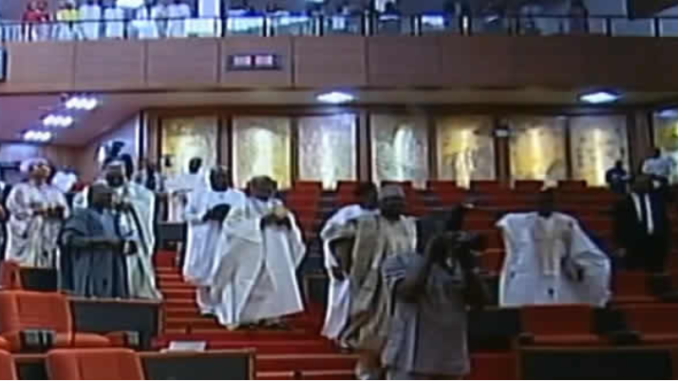
A Federal High Court in Abuja made a bold statement in its May 9 judgement, which nullified the Senate’s six-month suspension of Ovie Omo-Agege, thus underscoring the point that a lawmaking body cannot operate outside the frame of the law. The lawmaker, who resumed sitting on May 16, with no opposition, had opposed the Senate’s recent reordering of the sequence of the 2019 elections, which he claimed was targeted at President Muhammadu Buhari.
The senator from Delta State had taken the Senate to court over the matter. But the Ethics and Privileges Committee of the Senate punished Omo-Agege for that. The judge, Nnamdi Dimgba, in his declaration, dismissed the Senate’s grounds for its action. He said the 90-day clampdown on the senator was ultra vires, as the maximum penalty for any errant lawmaker was only 14 days as stipulated in the Senate Standing Rule.
Instructively, while the judge acknowledged Senate’s power to sanction any member if need be, he however declared that “no institution or authority has the powers to strip any citizen his right of access to court.” Whether in the Senate or House of Representatives, the National Assembly is notorious for reckless display of its powers.
The Senate had got away with the suspension of Ali Ndume, for 90 days, for demanding that it should clear the fog associated with a bulletproof vehicle it purchased for the office of its presiding officer, without due payment of customs duties, as alleged; and for another member to come clean on the authenticity of his degree, all of which earned the Senate a bad press.
In the House of Representatives, Abdulmumin Jibrin was suspended for 180 legislative days in September 2016 for exposing how the budget was padded with N40 billion to serve the interest of some principal officers. Just as in Omo Agege’s case, a Federal High Court in Abuja, on Thursday, declared his suspension a nullity. This was after the lawmaker had resumed upon the completion of his punishment. He apologised to the House and its leadership in line with the terms originally spelt out when he was suspended.
What is baffling in the Ndume and Omo-Agege suspensions is the fact that they are out of sync with the Legislative Houses (Powers and Privileged Act), Section 3, which deals with immunity from proceedings. Under it, “No civil or criminal proceedings may be instituted against any member of a legislative house – (a) in respect of words spoken before that House or a Committee thereof…”
This is a refuge parliamentarians enjoy so as not to be distracted in performing their duties. For Bukola Saraki and Yakubu Dogara, Senate President and House Speaker respectively, therefore, to be so protected by this law, and then oversee the unconstitutional and prolonged striping of their colleagues’ right to represent their constituencies is the height of vile and insensate politicking. It was not the affected lawmakers only that suffered while it lasted, even more bruised were their constituents.
The parliament must learn to play by the rules. At odd moments in a parliament, institutional memory comes in handy. Had this been exploited, the two weeks suspension of Isah Mohammed in 2004 for slapping a female colleague, Iyabo Anisulowo, would have served as a compass.
Interestingly, lawmakers are not the only victims of this abuse of power; other public office holders have also been harassed. They include ministers and heads of extra-ministerial departments: among them are the Comptroller-General of the Nigeria Customs Service, Hameed Ali; the Inspector-General of Police, Ibrahim Idris; the Acting Chairman of the Economic and Financial Crimes Commission, Ibrahim Magu; and a former Director-General of the Securities and Exchange Commission, Arumah Oteh.
In March last year, Ali had a rough battle with the Senate in the wake of the organisation’s resolve to tame smuggling and ensure collection of duties on all vehicles imported into the country. A bullet-proof Sports Utility Vehicle the Senate had bought was in breach of due process.
Ali was not only summoned to come and explain the policy, but was directed to do so, wearing the uniform of the NCS, which he had vowed not to put on, since his appointment. As he honoured the invitation without wearing it, he was turned back. Not willing to accept more embarrassments, he spurned further invitations. Ultimately, they called on the President to sack him.
Oteh found herself in the same sharks-infested waters with her appointment under the Goodluck Jonathan administration in 2012. In a witch-hunt by the House of Representatives that became a proxy war, the budget of SEC was not considered for one year, as the President ignored the lawmakers’ call to sack her.
The Minister of Solid Minerals, Kayode Fayemi, incurred the wrath of the lawmakers recently when he objected to their demand to inject $500 million into the Ajaokuta Steel Company that has guzzled about $8 billion for its completion, instead of being concessioned as provided for in the 2017 budget. Accordingly, the minister ignored a public hearing on this agenda. For standing up to what he considered to be right, they passed a vote of no confidence in him – not fit to be a minister.
The point must be made: although the lawmakers have the right to summon anybody, it is not in all cases that heads of Ministries, Departments and Agencies must appear personally for a parliamentary inquest. It has become commonplace and too debilitating for government business that such summonses are now greeted with disdain by invitees.
There is a limit to hubris and abuse of legislative powers. They drive the fuss often experienced between the lawmakers and those they summon. This erodes the authority and dignity of the parliament. Admittedly, the legislature carries the banner of democracy, as its members are representatives of the people. For this reason, lawmakers should work so hard to justify public confidence.
END

Be the first to comment